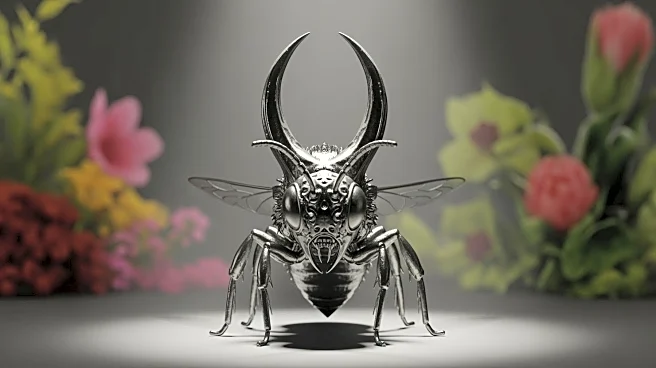What's Happening?
Scientists in Australia have identified a new species of native bee, named Megachile lucifer, characterized by its distinctive devil-like horns. The discovery was made during a survey of a critically endangered
wildflower in Western Australia's Goldfields in 2019. The female bees of this species possess upward-pointing horns, which are believed to assist in accessing flowers, competing for resources, and defending nests. This species is the first new member of its group to be described in over 20 years, as confirmed by DNA tests that showed no match with existing bee databases. The discovery underscores the importance of studying native bees, which are often understudied and face threats from habitat disturbance and climate change.
Why It's Important?
The discovery of the Megachile lucifer bee highlights the rich biodiversity of Australia's native bee population, which includes around 2,000 species. However, more than 300 of these species remain unnamed and undescribed, pointing to a significant gap in scientific knowledge. The lack of data on native bees poses a risk to their conservation, as many species could be lost before they are even recognized. This finding calls for stronger conservation policies to protect these bees from habitat loss and other environmental threats. The study also emphasizes the need for public awareness and appreciation of native bees, which play crucial roles in pollination and ecosystem health.
What's Next?
The discovery of the Megachile lucifer bee may prompt further research into Australia's native bee species, potentially leading to the identification and description of other unknown species. Conservationists and researchers are likely to advocate for stronger policies to protect native bee habitats from threats such as inappropriate fire regimes and megafires. Public engagement initiatives may also be launched to encourage Australians to explore and appreciate their native bee populations, fostering a greater understanding of their ecological importance.
Beyond the Headlines
The discovery of the Megachile lucifer bee raises broader questions about biodiversity conservation and the impact of climate change on lesser-known species. As native bees face increasing threats, there is a growing need to balance development and conservation efforts. This situation highlights the ethical responsibility of scientists and policymakers to protect vulnerable species and their habitats. The study also reflects a cultural shift towards valuing and preserving native wildlife, which is essential for maintaining ecological balance and resilience.











